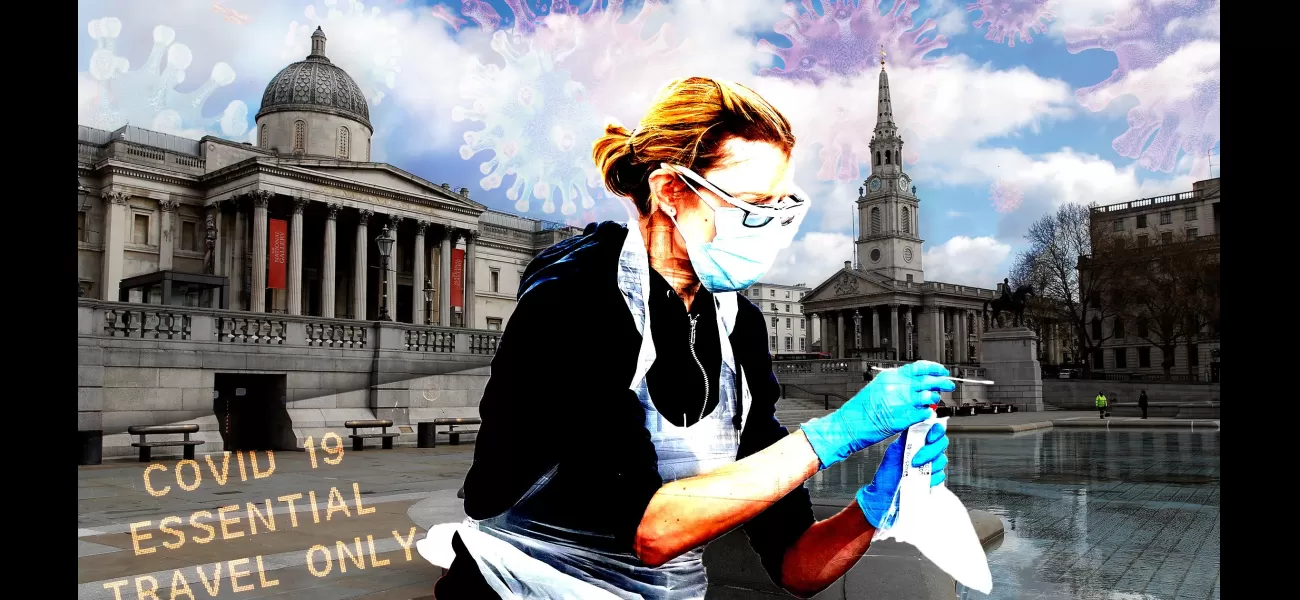A woman is still scared to leave her house four years after the first Covid lockdown, saying it almost took her life.
A disabled woman, who continues to isolate due to Covid, hasn't hugged her grandchildren in years out of fear for her life.
March 23rd 2024.

It has been four years since the first Covid lockdown in Britain, and for one woman, living in isolation and unable to hug her grandchildren has become the new norm. Back in March 2020, Prime Minister Boris Johnson announced the national lockdown, but little did anyone know the chaos and devastation that would follow. As the pandemic wreaked havoc, claiming over 233,000 lives, some chose to ignore the rules, including staff at Number 10 Downing Street, leading to the infamous Partygate scandal. Since then, life has somewhat returned to "normal" for many, but for those who are clinically vulnerable or struggling with long Covid, fear and isolation continue to be their reality.
Nicky Myers, a 51-year-old from Cambridge, is one of those who continue to shield, as she knows firsthand the deadly consequences of contracting Covid. She shares, "I have almost gotten used to it, almost. I have six grandchildren who I can't see, and it breaks my heart. They are all under ten and, as we all know, they are little germ monsters." For Nicky, contracting any disease, not just Covid, is a serious matter. She is clinically vulnerable and disabled due to a genetic condition, as well as a lung disease called bronchiectasis and pulmonary fibrosis. As a result, her lungs can only function at 14% capacity, and she relies on supplemental oxygen to help her breathe.
Before Covid, Nicky was able to get around with an oxygen tank attached to her wheelchair, but since contracting the virus in October 2022 during a hospital visit, even getting out of bed has become a challenge. She recalls, "I spent two weeks in the hospital on anti-virals, and it was a very touch and go situation. Then I developed pneumonia as well. I still don't know how I made it through." As the world hunkered down and stayed indoors following the first lockdown, Nicky remembers those early days being "absolutely awful." She shares, "My lung disease wasn't initially on the list of conditions that required shielding, which seemed ridiculous to me, considering the severity of my condition. It took the government a month to recognize the need for services like food delivery for those who were shielding. I knew that if I were to catch Covid, there would be little chance of survival."
In March 2020, 2.2 million people were advised to shield due to being clinically extremely vulnerable, and by February of the following year, that number had increased to 1.7 million. For Nicky, the last time she went out socially before shielding began was on March 13, 2020, to attend a Senegalese drumming workshop. Even accessing her garden has become a challenge due to the difficulties of using her wheelchair. She shares, "I have no resistance to anything anymore because I stopped going out. I even avoid going to the hospital now because of what happened last time." Nicky hasn't been to the shops in years, and yet, she has managed to "carve out a life" for herself, despite the challenges. She has learned to paint, volunteers to teach music and production, and remains active in her union, all from the comfort of her bed.
Nicky bears no ill will towards those who are able to go out and live their lives, as that is what the government has deemed safe. She explains, "I don't blame regular people for going about their lives, because that's what the government is telling them to do. They say it's all fine, just carry on. However, I do feel like the government has forgotten about us again." Even with the recent spike in Covid cases, Nicky feels like there are still not enough measures in place to protect those who are clinically vulnerable. She shares, "Things like mask-wearing, even when numbers are high, people don't seem to bother, even in hospitals." For those who are immunocompromised, like herself, living with a constant fear of getting sick is a daily reality. She adds, "I know it's not just me. There are thousands and thousands of people in the same situation. There are so many immunocompromised individuals in this country, and they have to be extra careful now because more people are out and about, which could be life-threatening for them. I've had to build a life around these circumstances out of necessity."
Nicky Myers, a 51-year-old from Cambridge, is one of those who continue to shield, as she knows firsthand the deadly consequences of contracting Covid. She shares, "I have almost gotten used to it, almost. I have six grandchildren who I can't see, and it breaks my heart. They are all under ten and, as we all know, they are little germ monsters." For Nicky, contracting any disease, not just Covid, is a serious matter. She is clinically vulnerable and disabled due to a genetic condition, as well as a lung disease called bronchiectasis and pulmonary fibrosis. As a result, her lungs can only function at 14% capacity, and she relies on supplemental oxygen to help her breathe.
Before Covid, Nicky was able to get around with an oxygen tank attached to her wheelchair, but since contracting the virus in October 2022 during a hospital visit, even getting out of bed has become a challenge. She recalls, "I spent two weeks in the hospital on anti-virals, and it was a very touch and go situation. Then I developed pneumonia as well. I still don't know how I made it through." As the world hunkered down and stayed indoors following the first lockdown, Nicky remembers those early days being "absolutely awful." She shares, "My lung disease wasn't initially on the list of conditions that required shielding, which seemed ridiculous to me, considering the severity of my condition. It took the government a month to recognize the need for services like food delivery for those who were shielding. I knew that if I were to catch Covid, there would be little chance of survival."
In March 2020, 2.2 million people were advised to shield due to being clinically extremely vulnerable, and by February of the following year, that number had increased to 1.7 million. For Nicky, the last time she went out socially before shielding began was on March 13, 2020, to attend a Senegalese drumming workshop. Even accessing her garden has become a challenge due to the difficulties of using her wheelchair. She shares, "I have no resistance to anything anymore because I stopped going out. I even avoid going to the hospital now because of what happened last time." Nicky hasn't been to the shops in years, and yet, she has managed to "carve out a life" for herself, despite the challenges. She has learned to paint, volunteers to teach music and production, and remains active in her union, all from the comfort of her bed.
Nicky bears no ill will towards those who are able to go out and live their lives, as that is what the government has deemed safe. She explains, "I don't blame regular people for going about their lives, because that's what the government is telling them to do. They say it's all fine, just carry on. However, I do feel like the government has forgotten about us again." Even with the recent spike in Covid cases, Nicky feels like there are still not enough measures in place to protect those who are clinically vulnerable. She shares, "Things like mask-wearing, even when numbers are high, people don't seem to bother, even in hospitals." For those who are immunocompromised, like herself, living with a constant fear of getting sick is a daily reality. She adds, "I know it's not just me. There are thousands and thousands of people in the same situation. There are so many immunocompromised individuals in this country, and they have to be extra careful now because more people are out and about, which could be life-threatening for them. I've had to build a life around these circumstances out of necessity."
[This article has been trending online recently and has been generated with AI. Your feed is customized.]
[Generative AI is experimental.]
0
0
Submit Comment





